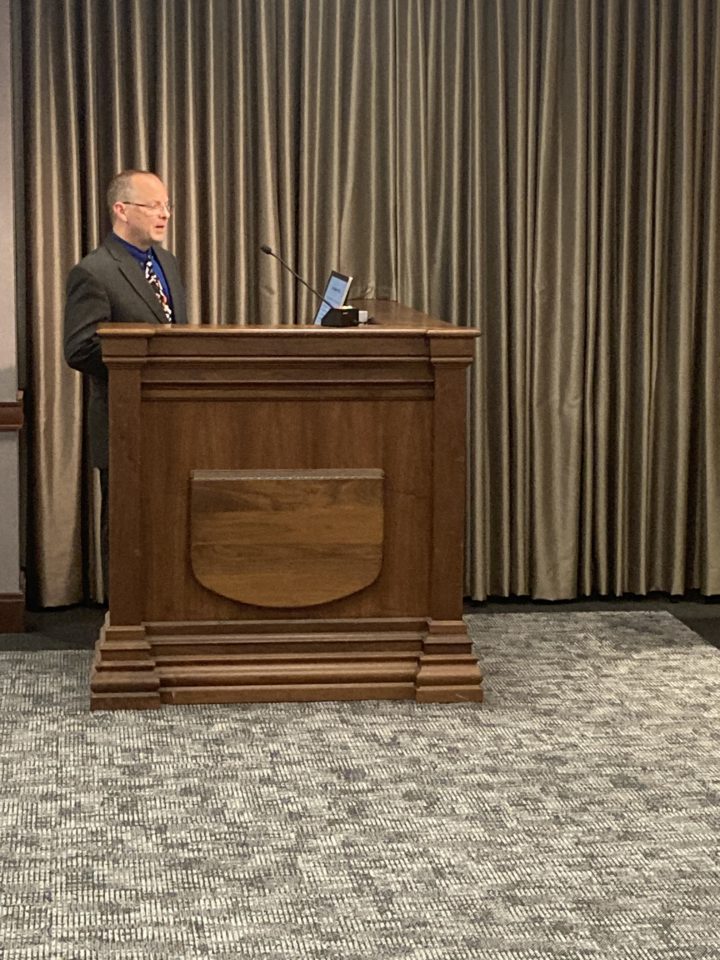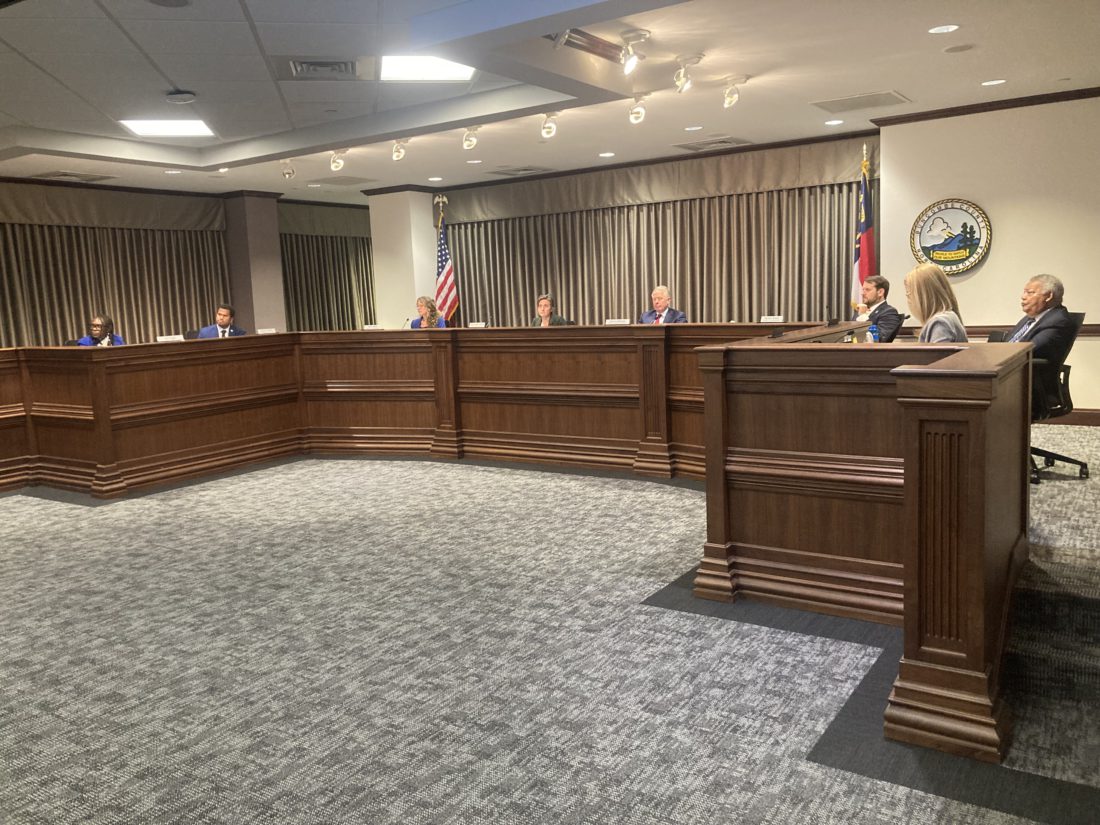Seven years to the week after the Party Rock fire roared through the mountains near Lake Lure, officials said the region is as dry and vulnerable to major burns as it was in 2016. In fact, four fires were already burning in Western North Carolina Nov. 7, and a state of emergency has been issued in Buncombe County banning all outdoor burning, including in fire pits, camp fires, tiki torches and chimineas.
Ryan Cole, emergency services assistant director for Buncombe County, told the Buncombe County Board of Commissioners Nov. 7 that conditions now remind him of what fueled the blaze that burned more than 7,000 acres in three weeks near the Buncombe-Henderson county line.
“In [my] opinion, we are about the same dryness as we were, if not more than in 2016,” he warned. That was also the year of devastating fires in Gatlinburg, Tenn.

That dryness, plus low atmospheric humidity, unstable wind conditions, multiple fires in the region depleting local resources and a forecast without significant rainfall projections have combined to prompt the current local state of emergency. Gov. Roy Cooper issued a statewide state of emergency due to the fire-prone conditions Nov. 8.
A fire in DuPont State Forest was 100% contained Nov. 10, and a Jackson County fire was 95% contained going into the weekend where the region saw limited rainfall. Fires in Henderson and Cherokee counties continued to burn as of Nov. 13. A small brush fire off Deaverview Road in Asheville sparked earlier this month but was quickly contained with limited damage.
The 2016 Party Rock fire, which was ultimately found to be started by a cigarette tossed out by a 17-year-old, caused more than 1,000 people to be evacuated from their homes in the Lake Lure and Chimney Rock areas.
“We had many homes that had to be protected by going in and doing abatement and clearing out and creating defensible spaces around those homes because they were not prepared, which took extensive time and slowed down our response,” remembered Cole.
That can be avoided this year if homeowners take some precautions now, he said.
Residents in both urban and rural settings should clear up to 100 feet from their homes of dry leaf litter, dead plant material or anything else that might be highly flammable, Cole said. Additionally, residents should clean out their gutters because a spark can light leaves on fire and help a blaze spread, even if they are off the ground, he said.
“The most important thing that we can do is ensure that the public is able to help us protect them through preparing their homes and having them ready for wildfire,” he said.
Buncombe’s state of emergency will last until risk factors recede, which will require significant rainfall that is not in the forecast, Cole said.
Meanwhile, the N.C. Forest Service has canceled all burn permits and has an open burning ban in place for most WNC counties, including Buncombe, Haywood and Yancey.
Jails diversion program having success
Buncombe County is making progress toward its goal to reduce repeat bookings into the jail, Tiffany Iheanacho, director of Buncombe’s justice services department, reported to commissioners Nov. 7.
The department’s community diversion program, which received a $1.1 million grant in October from the John D. and Catherine T. MacArthur Foundation, has seen a 39% reduction in repeat bookings within the three months after people were enrolled in the program, Iheanacho said.
Strategies included connecting participants recently released from jail who have a risk of re-incarceration based on housing, mental health or substance abuse issues to community resources. The program lines up services such as treatment at the Mountain Area Health Education Center, a cellphone, bus tickets, hygiene products or basic clothing, according to Iheanacho’s presentation.
A challenge for the program is that many people are in jail because they didn’t show up for their court proceedings. Of the jail’s 430 inmates Oct. 30, 55 — 13% — were booked because they didn’t appear in court, Iheanacho said.
Commissioner Jasmine Beach-Ferrara used as an example someone who is arrested for a low-level misdemeanor, is charged a fine and released, but if they miss their court date, they could get arrested again for a failure to appear in court, leading to more fines and a vicious cycle.
“I’m just trying to understand how this cycle fits into our broader community efforts to safely reduce the jail population and intervene in that cycle and break that cycle with our jail diversion program. That seems to be exactly the cycle we’re trying to break with our diversion efforts,” she said.
The department is working on lowering the amount of failures to appear via a court reminder system and a court navigator, who greets visitors in the courthouse lobby, but there’s clearly more work to do, Iheanacho acknowledged.
Commissioners praised the department’s work, but Commissioner Parker Sloan questioned whether Asheville Police Department’s recent crime sweeps conflict with the county’s goals. APD conducted at least two special operations last month arresting 111 people, mostly for low-level crimes such as panhandling and trespassing.
While Iheanacho said that anecdotally, many of those recent arrests were for crimes that didn’t require jail time, she would have to take a closer look at the recent data to determine the impact of the sweeps.
Commissioner Martin Moore said the interventions are making progress toward reducing recidivism, but progress is disrupted at each stage because not all local agencies are working toward the same goal, costing the county more money for more interventions.
“How do we capture where that breakdown is? Do we have a city contemporary we can speak with so we’re all walking in the same direction? Because it feels like three steps forward, two steps back, and we’re going to bankroll the next three steps forward as well,” he said.
Beach-Ferrara echoed Moore’s frustrations.
“The problem that we are facing is that we have a law enforcement agency that is deploying a strategy to arrest precisely the individuals we are deploying all these strategies to try to keep out of jail for many reasons including efficient use of public resources. I think there’s an inherent tension there,” she said, referring to APD.
County Manager Avril Pinder suggested commissioners take the conversation to the Justice Resources Advisory Council, a collaboration between county leadership and representatives from criminal justice and the court system to discuss how to get all jurisdictions on the same page.
Commissioner Amanda Edwards wondered what happens if the city won’t come to the table, or if they don’t agree when they get there.
“What if they’re not on board with supporting the direction of the county? How do we continue moving forward with our goals of what we believe is best when said partners aren’t on board?”
Commissioner Al Whitesides laid his thoughts out plainly.
“[The City of Asheville] continues to be the roadblock. It’s frustrating as heck.”
This story was updated Nov. 13 to reflect the new status of fires burning in DuPont State Forest and Jackson County.




Before you comment
The comments section is here to provide a platform for civil dialogue on the issues we face together as a local community. Xpress is committed to offering this platform for all voices, but when the tone of the discussion gets nasty or strays off topic, we believe many people choose not to participate. Xpress editors are determined to moderate comments to ensure a constructive interchange is maintained. All comments judged not to be in keeping with the spirit of civil discourse will be removed and repeat violators will be banned. See here for our terms of service. Thank you for being part of this effort to promote respectful discussion.